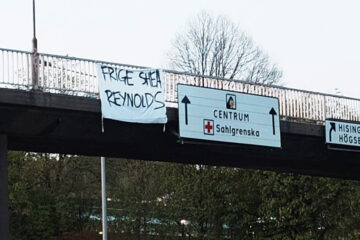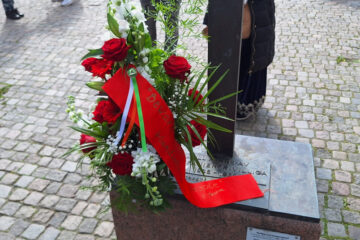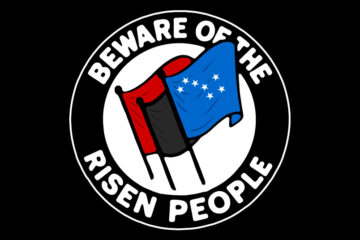(Text in English, further down)
Årets Seamus Costello commemoration var ovanligt välbesökt. Anledningen var naturligtvis att det i år var 30 år sedan Costello mördades. Uppsaskattningsvis 3000 personer deltog i marschen.
Årets anförande (går att finna längre ned i artikeln) hölls av Paul Gallagher.
This year’s Seamus Costello commemoration was exceptionally well attended. The reason, of course, was that it was 30 years since Costello was murdered this year. An estimated 3,000 people participated in the march.
This year’s speech was given by Paul Gallagher.
speech:
Friends and Comrades,
On behalf of the Irish Republican Socialist Party I want to welcome you all here today for this, the thirtieth anniversary commemoration of the assassination of Seamus Costello, the first chairperson of the Irish Republican Socialist Party and the first Chief of Staff of the Irish National Liberation Army.
Seamus was a native of Bray and never tired of battling for the needs of this town and it’s people. It is fitting therefore that before I begin I would like to pay tribute to the two local men, Brian Murray and Mark O’Shaugnessy, the two part-time firefighters who died while fighting a fire in Bray recently. Both were serving their community when they died and we offer our heartfelt condolences to their families and their communities on this very tragic loss. Seamus Costello, if he was alive today and given our knowledge about his beliefs and his politics, would be screaming from the rooftops about this tragic incident and the fact that a town the size of Bray has to make do with a part time fire service. Seamus stood shoulder to shoulder with the workers and fought tooth and nail for the betterment of their safety and conditions. It is a great honour personally for myself to be asked to give this oration on this milestone anniversary and it is very heartening to see how many have made the long journey from all parts of Ireland to honour Seamus thirty years after his death. This shows that the politics and ideals of Seamus live on in the membership and supporters of the IRSP.
Seamus Costello was someone who was involved in each and every struggle of the working class, not just in the town of Bray and in the county of Wicklow but throughout Ireland. He travelled the length and breadth of the country agitating and organising. His first involvement in Republican politics came in 1953 when he read of the arrest of Cathal Goulding following an arms raid on the Officer Training Corps School at Felstead in Essex. Costello on one of his many visits to Croke Park, bought a copy of the United Irishman and immediately applied to join the Republican Movement. However, he was told to ”come back next year”. Costello did and was accepted into the ranks of the IRA and Sinn Fein in 1954. The first Sinn Fein Cumann was started in Bray in the same year, comprised mostly from members of the Dun Laoghaire Cumann, their activity confined to ’United Irishman’ sales. However, it wasn’t long before it was being sold in every area in Co. Wicklow. During the Border Campaign Costello, who was only 17 at the time commanded an active service unit in South Derry, their most publicised actions being the destruction of bridges and the burning of Magherafelt Courthouse. Those under his command described him as strict but radiating confidence. This time in South Derry earned him the nickname ”the Boy General”
In 1957 he was sentenced to six months in Mountjoy. On his release he was immediately interned in the Curragh for two years. Costello, as a prisoner, was described by fellow internees as quiet, rarely joining others in playacting, preferring deep discussion and reading. He was a member of the escape committee which engineered the successful escape of Ruari O’Braidaigh and Daithi O’Connell amongst others. He is remembered by one internee reading Vietnamese magazines and it impressed Costello that peasants badly armed but with a deep political ideology could defeat their enemies. In later years he always referred to his days in the Curragh as ”my university days”. He took part in the critical analysis of the 50’s campaign, agreeing that it had failed due to lack of popular involvement as distinct from popular support. On the ending of internment in 1959 Costello assisted in the re-organising of the Republican Movement. He became full time political organiser for Wicklow at this period and developed a strong link with every conceivable organisation in the county that dealt with the interests of the working class. He managed to involve the Bray Trades Council in the 1966 Easter Commemoration and helped found a strong Tenants Association in Bray. He also became involved with the Credit Union movement and farmers’ organisations. In 1966 he gave an historic oration at the Wolfe Tone Commemoration in Bodenstown which marked a turn to the left for the Republican Movement, the result of years of discussions within the Movement ably assisted by Costello.
He said: ”We believe that the large estates of absentee landlords should be acquired by compulsory acquisition and worked on a cooperative basis with the financial and technical assistance of the State… our policy is to nationalise the key industries with the eventual aim of co-operative ownership by the workers… nationalisation of all banks, insurance companies, loan and investment companies…”
But Costello always maintained not only the right to use armed force but the necessity for workers to be armed and this remained his position up to his assassination. During the same speech in Bodenstown he said: ”The lesson of history shows that in the final analysis the Robber Baron must be disestablished by the same methods that he used to enrich himself and retain his ill gotten gains, namely force of arms. To this end we must organise, train and maintain a disciplined armed force which will always be available to strike at the opportune moment”
These were the ideas that formed the basis for Seamus’ politics that led to him forming the IRSP and the INLA in 1974 following a split in the Official Republican Movement. He was a revolutionary in the true sense of the word. He believed in the strength of a unified and politically motivated working class and firmly believed that the Republican Socialist Movement was the organisation that would galvanise and combine the struggle for National Liberation and the struggle for Socialism. It was a position that was first articulated by James Connolly and is now proudly carried forward to the future within the membership and supporters of the IRSP. I could go on all day reminiscing about Seamus and the ifs and buts of that day in 1977 when that apolitical gunman cold bloodedly assassinated him. Instead it is our duty as revolutionaries to carry forward the struggle that Seamus was part of.
But that struggle has changed and we must acknowledge that fact. the 2007 Life and Times Survey showed that 85 per cent of Protestants and 22 per cent of Catholics in the north support Northern Ireland remaining part of the United Kingdom. Partly for those reasons, senior Irish government sources have stated that they do not expect Northern Ireland’s constitutional position to be raised again for ”20 to 25 years”. The Dublin administration opinion comes after the British Secretary of State for the North told the News Letter: ”I think that, in a sense, the constitutional question is parked.”
This does not mean that Republicanism has to be abandoned for come pure version of socialism. Given it’s historical weight and progressive content, it is impossible to build a progressive current outside it or independent of it. This is the demarcation criteria between the IRSP and most other socialist organisations in Ireland. The fact that Republicanism is going through a marginalisation sets limits upon and narrows the basis for Republicanism to develop, but opportunities, however minor, will arise. An example of this is the recent attempts to build republican unity of which the IRSP took part. These should be used to develop what is best in republicanism. There clearly are a number of points on which all Republicans will agree. First that Republicanism is in tension with nationalism rather than a version of it. Republicanism is neither based on ’territory’ or ’nationality’ nor on ’identity’. The core of Republicanism is democracy. This implies self-determination without external impediment, from which flows the rejection of the principle of consent and other parameters are imposed by external power unaccountable to Irish democracy. It is not that Republicanism disregards the issue of Unionist consent to future political arrangements, where it differs with other political forces like constitutional nationalism is that it refuses Unionist consent to be a prerequisite for constitutional change. While arguing that it is undesirable to coerce a ’minority,’ republicanism contends that to give a guarantee to a ’minority’ in advance against all coercion is to put a premium on unreasonableness and to make a settlement impossible. Finally, Republicans can agree that the government of the 26 counties as much as the 6 counties retain their legitimacy by a denial and circumscription of political democracy, in other words the denial of democracy, aided and abetted by both regimes on this island and this is the major stumbling block towards national unity. This is why the traditional republican position is to deny legitimacy to 6 and 26 county states. For the IRSP, it is clear that democracy is at the heart of the historical tasks facing the working class. Socialism’s lineage is also with democracy. Republicanism and Socialism are like cousins more than two sides of the same coin. It is possible to be a Republican or a democrat without being a Socialist. This is why in relation to other Republican tendencies, it is imperative to emphasize not just the democratic, but also the internationalist, popular and egalitarian aspects of Republicanism.
The IRSP is best placed to articulate the social content of Republicanism and address the question of what social forces to mobilise in what Connolly called ”The Reconquest of Ireland”. Comrades, our movement has taken huge strides since the dark days of the murderous attacks on our right to organise. Brave comrades of the calibre of Seamus Costello were killed by our enemies in a bid to remove the radical voice of Republican Socialism from the political landscape. It would be a shame and dare I say it, a disgrace, if all here who proclaim to be followers of Connolly and Costello did not do all in their power to build the party to a position of real strength and influence so that the working class in Ireland can have a party that will truely represent them. I ask you all here to question yourselves and your commitment, not just to the party but to the working class. Remember that when Seamus Costello was killed he was involved in all aspects of working class struggle in and around Bray. He was a member of Wicklow County Council, County Wicklow Committee of Agriculture, General Council of Committees of Agriculture, Eastern Regional Development Organisation, National Museum Development Committee, Bray Urban District Council, Bray Branch of the Irish Transport and General Workers Union, Bray and District Trade Unions Council, of which he was president 1976-77 and the Cualann Historical Society. He was also the chairperson of the Irish Republican Socialist Party and Chief of Staff of the Irish National Liberation Army. We must take our inspiration from Seamus, look at what he was able to achieve and emulate that throughout the 32 counties of Ireland. Our task is not to use the struggles of the working class as a vehicle to promote and grow the party, rather it is to use the vehicle of the party to further all the struggles of the working class. We must empower communities to tackle head on the hardships of life under the capitalist regimes north and south.
We should not be found wanting when it comes to opposing the selling of our natural resources to companies like Shell, we must defend our heritage and demand that this government re-routes the M3 motorway away from the Hill of Tara, we must oppose the parasitic drug dealers who prey on our young people, the implementation of the water charges in the north. We must build and strengthen so as we can become a realistic alternative to the corruption that reeks from the very top of the government at Leinster House and the petty sectarian jamboree at Stormont. So I make this call on behalf of the leadership of the IRSP, get involved in the day to day struggles, follow the examples of James Connolly and of Seamus Costello and we can’t go very far wrong.
On to the republic comrades!
Go raith mile maith agat!


